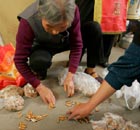Foreign and Military Affairs
Diaoyu are sovereign: Beijing
By Li Xiaokun (China Daily)
Updated: 2010-11-02 07:47
 |
Large Medium Small |
BEIJING - The Ministry of Foreign Affairs on Monday strongly reprimanded Tokyo for its assertion that China is at fault for a maritime collision near the Diaoyu Islands in September, saying the fact is that Japan has no right to disturb or harass Chinese vessels in Chinese territorial waters.
It is illegal for the Japanese authorities to seize Chinese fishing ships in waters around the Diaoyu Islands, which have been part of China since ancient times, the ministry's spokesman Ma Zhaoxu said in a press release on the website.
The Japanese move "seriously infringed upon China's territorial sovereignty and legal rights of the Chinese fishermen. The so-called footage cannot change the facts, nor can it cover the illegality of the Japanese move," said the document.
Earlier on Monday, Tokyo showed about 30 lawmakers, from the budget committees of the lower and upper houses, the 6-minute, 50-second video of the Sept 7 collisions in which a Chinese trawler collided with two Japanese patrol vessels near the Diaoyu Islands.
However, several parliament members complained to the Japanese media that the edited video could not fully support such a conclusion. The viewing took place after the lower house panel requested it last month.
Meanwhile, the footage made public was edited by the Naha District Public Prosecutors Office, according to officials. The original video, shot at the time of the collisions by the Japan Coast Guard, is said to last about two hours.
Japan's Kyodo News Agency said since the edited video is too short, there is "possibility of juggling" - and that the Liberal Democratic Party is considering of holding a hearing of local prosecutors for that regard.
The Chinese media on Monday cited fishermen working at the same port from where the Minjinyu 5179 departed from as saying that the highest speed of the Chinese ship was only-one third of that of the two Japanese vessels.
The fishermen said it was hence impossible for the Chinese ship to have intentionally pursued the Japanese ships - as the Japanese government claims - but that the Japanese ships stayed in front of the Chinese ship and forced it to stop.
It is most likely that the Chinese vessel failed to avoid the Japanese ship - thus resulting in the collision, they said.
The key point of Beijing's stance is that Chinese ships should not be targeted by Japan while within Chinese territory, according to Gao Hong, deputy chief for Japanese studies at the Chinese Academy of Social Sciences.
Japan used to illegally drive out Chinese fishing boats. But the stakes have been raised with illegal detaining of boats and their crew, Gao said.
"Japan is trying to impute its responsibilities to China through this video," he said.
Zhou Yongsheng, a professor of Japanese studies at the Beijing-based China Foreign Affairs University, said since the video has not been made available to the public or other members of parliament, "it can be interpreted that Japan still takes into consideration of the overall situation of Sino-Japanese ties".
The video has further inflamed a row that has escalated into protests, seen meetings between the two sides scrapped and triggered accusations from Tokyo that China is blocking exports of vital minerals, which Beijing denied.
The row peaked on Saturday when China cancelled at the last minute a formal meeting between Premier Wen Jiabao and his Japanese counterpart Naoto Kan in Hanoi for repeated irritating words Japanese officials made about the territorial dispute at a series of international summits there.
Seeking fence-mending opportunities, chief Japanese government spokesman Yoshito Sengoku said Tokyo expects President Hu Jintao to visit and hold talks with Kan during Asia-Pacific Economic Cooperation forum meetings near Tokyo later this month.
AFP and Zhou Wa contributed to this story.












